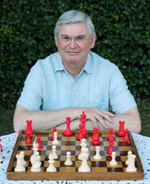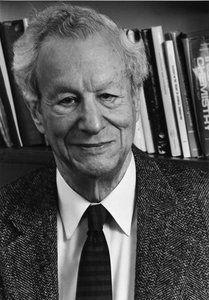See also
| Search for "pfizer award" on Wikipedia. |
| This disambiguation page lists articles associated with the title Pfizer Award. If an internal link led you here, you may wish to change the link to point directly to the intended article. |
Pfizer Award is an annual award for the best book on the history of science, awarded by the History of Science Society
Pfizer Award, awards named Pfizer, may also refer to:
| Search for "pfizer award" on Wikipedia. |
| This disambiguation page lists articles associated with the title Pfizer Award. If an internal link led you here, you may wish to change the link to point directly to the intended article. |

Sir Alan Roy Fersht is a British chemist at the Laboratory of Molecular Biology and an Emeritus Professor in the Department of Chemistry at the University of Cambridge; and is a former Master of Gonville and Caius College, Cambridge. He works on protein folding.
Benjamin Franklin Cravatt III is a professor in the Department of Chemistry at The Scripps Research Institute in La Jolla, California. Considered a co-inventor of activity based proteomics and a substantial contributor to research on the endocannabinoid system, he is a prominent figure in the nascent field of chemical biology. Cravatt was elected to the National Academy of Sciences in 2014, and the American Academy of Arts and Sciences in 2016. He is Gilula Chair of Chemical Biology, a Cope Scholar, and a Searle Scholar.

Frank Henry Westheimer was an American chemist. He taught at the University of Chicago from 1936 to 1954, and at Harvard University from 1953 to 1983, becoming the Morris Loeb Professor of Chemistry in 1960, and Professor Emeritus in 1983. The Westheimer medal was established in his honor in 2002.

Gerald Francis "Jerry" Joyce is a professor and researcher at Salk Institute for Biological Studies and the director of the Genomics Institute of the Novartis Research Foundation. He is best known for his work on in vitro evolution, for the discovery of the first DNA enzyme (deoxyribozyme), for the development of the first self replicating RNA enzyme and more in general for his work on the origin of life.

Ronald T. Raines is an American chemical biologist. He is the Roger and Georges Firmenich Professor of Natural Products Chemistry at the Massachusetts Institute of Technology. He is known for using ideas and methods of physical organic chemistry to solve important problems in biology.
Christopher David Garner FRSC FRS is a retired British chemist, whose research work was in the growing field of Biological Inorganic Chemistry. His research primarily focussed on the role of transition metal elements in biological processes, for which he published over 400 original papers and reviews on the topic. His specific interests lie in the roles of Molybdenum and Tungsten as the metal centres in various enzyme cofactors based on the molybdopterin molecule.

Richard Bruce Silverman is the Patrick G. Ryan/Aon Professor of Chemistry at Northwestern University. His group's main focus is basic and translational research into central nervous system disorders and cancer. He is the author of more than 360 research publications, 96 patents, and several books, including The organic chemistry of drug design and drug action, now in its third edition; the third edition was co-written by Mark W. Holladay. He is well known for the discovery of pregabalin, which is marketed by Pfizer under the trade name Lyrica.

William Platt Jencks was an American biochemist. He was noted particularly for his work on enzymes, using concepts drawn from organic chemistry to understand their mechanisms.

Frances Hamilton Arnold is an American chemical engineer and Nobel Laureate. She is the Linus Pauling Professor of Chemical Engineering, Bioengineering and Biochemistry at the California Institute of Technology (Caltech). In 2018, she was awarded the Nobel Prize in Chemistry for pioneering the use of directed evolution to engineer enzymes.

JoAnne Stubbe is an American chemist best known for her work on ribonucleotide reductases, for which she was awarded the National Medal of Science in 2009. In 2017, she retired as a Professor of Chemistry and Biology at the Massachusetts Institute of Technology.
Jeremy Keith Morris Sanders is a British chemist and Emeritus Professor in the Department of Chemistry at the University of Cambridge. He is also Editor-in-Chief of Royal Society Open Science. He is known for his contributions to many fields including NMR spectroscopy and supramolecular chemistry. He served as the Pro-Vice-Chancellor for Institutional Affairs at the University of Cambridge, 2011–2015.

Neil L. Kelleher is the Walter and Mary Elizabeth Glass Professor of Chemistry, Molecular Biosciences, and Medicine at Northwestern University. His research focuses on mass spectrometry, primarily its application to proteomics. He is known mainly for top-down proteomics and the development of the fragmentation technique of electron-capture dissociation with Roman Zubarev while in Fred McLafferty's lab at Cornell University.
The Pfizer Award in Enzyme Chemistry, formerly known as the Paul-Lewis Award in Enzyme Chemistry was established in 1945. Consisting of a gold medal and honorarium, its purpose is to stimulate fundamental research in enzyme chemistry by scientists not over forty years of age. The Award is administered by the Division of Biological Chemistry of the American Chemical Society.

Judith P. Klinman is an American chemist, biochemist, and molecular biologist known for her work on enzyme catalysis. She became the first female professor in the physical sciences at UC Berkeley in 1978. In 2012, she was awarded the National Medal of Science by President Barack Obama.
Jeremy K. Nicholson is a professor and pro vice chancellor of Health Sciences at Murdoch University in Perth, Western Australia, where he leads the Australian National Phenome Centre. He is also an emeritus professor of Biological Chemistry at Imperial College London and the director and principal investigator of the MRC-NIHR National Phenome Centre that is based in Imperial College.

Nigel Shaun Scrutton is a British biochemist and biotechnology innovator known for his work on enzyme catalysis, biophysics and synthetic biology. He is Director of the UK Future Biomanufacturing Research Hub, Director of the Fine and Speciality Chemicals Synthetic Biology Research Centre (SYNBIOCHEM), and Co-founder and Director of the 'fuels-from-biology' company C3 Biotechnologies Ltd. He is Professor of Enzymology and Biophysical Chemistry in the Department of Chemistry at the University of Manchester. He is former Director of the Manchester Institute of Biotechnology (MIB).
Emily P. Balskus is an American chemical biologist, enzymologist, microbiologist, and biochemist born in Cincinnati, Ohio in 1980. She has been on the faculty of the Chemistry and Chemical Biology department of Harvard University since 2011 and is currently the Morris Kahn Associate Professor. She has published more than 80 peer-reviewed papers and three book chapters. Since 2012 she has been invited to give over 170 lectures, has held positions on various editorial boards, and served as a reviewer for ACS and Nature journals among others. Balskus also currently serves as a consultant for Novartis, Kintai Therapeutics, and Merck & Co.
Sarah E. O'Connor is an American molecular biologist working to understand the molecular machinery involved in assembling important plant natural products - vinblastine, morphine, iridoids, secologanin - and how changing the enzymes involved in this pathway lead to diverse analogs. She was a Project Leader at the John Innes Centre in the UK between 2011 and 2018. O'Connor was appointed by the Max Planck Society in 2018 to head the Department of Natural Product Biosynthesis at the Max Planck Institute for Chemical Ecology in Jena, Germany, taking up her role during 2019.
Ruma Banerjee is a professor of enzymology and biological chemistry at the University of Michigan Medical School. She is an experimentalist whose research has focused on unusual cofactors in enzymology.
Pfizer may refer to: